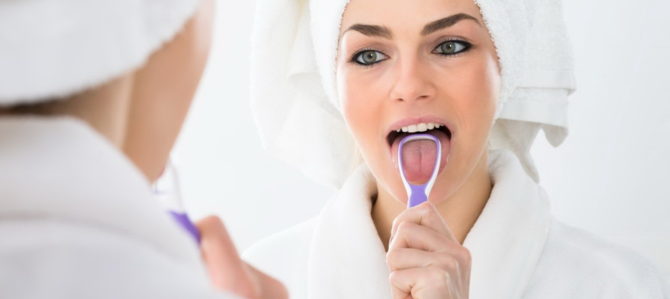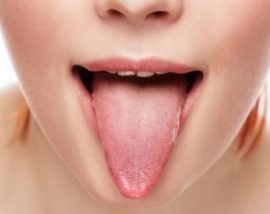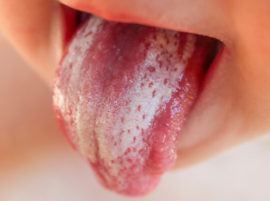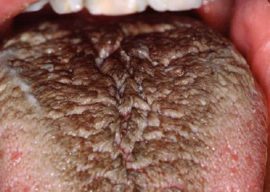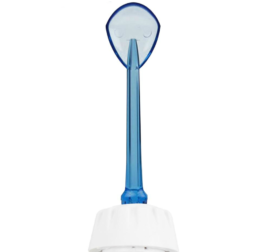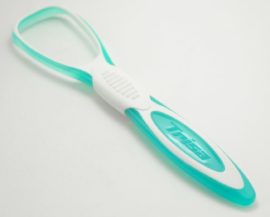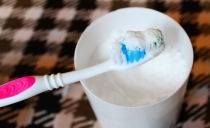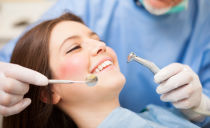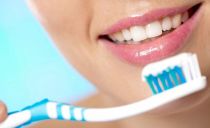Cleaning the tongue from plaque at home: is it necessary, effective devices and methods
Language is a vital organ involved in the digestion process, responsible for recognizing tastes and reproducing speech. When cleaning the oral cavity from plaque, consisting of the remains of food, saliva and bacteria, many pay attention only to their teeth, losing sight of the fact that the tongue needs to be cleaned to a lesser extent.
Content
Is it necessary to clean the tongue of plaque and why do it
The tongue should be cleaned of plaque daily during morning hygiene procedures. Regular and high-quality cleaning of the organ of taste:
- reduces the concentration of pathogenic bacteria in the oral cavity;
- It is an excellent prevention of infectious diseases;
- prevents the development of digestive problems;
- Helps protect tooth enamel and prevents tooth decay;
- eliminates the unpleasant odor from the oral cavity;
- improves taste perception.
As traditional Chinese medicine says, 40 acupuncture points affecting the brain are located in the language. Cleaning the tongue acts as a kind of massage that has a positive effect on the brain, which improves alertness and concentration.
The language of a healthy person is pink. It should be elastic, moist, without wounds, cracks and swelling. Even with perfect health, a thin layer of white or gray plaque periodically forms in the mouth, which can be easily removed by performing simple hygiene procedures.
But the plaque can be different: one can be removed independently, and the other - only after prolonged treatment under medical supervision. Plaque in the tongue is a kind of indicator of the state of human health, therefore, with any changes in its color or structure, you should consult a doctor to identify and treat a disease that provoked the development of such signs.
Why does a plaque appear on the tongue and its signs
Plaque is even in the language of a perfectly healthy person. It appears because the particles of food consumed are delayed between the tasteful villi and the lingual papillae, causing active reproduction of bacteria. Over time, bacteria die due to the work of the immune system, but they do not disappear without a trace - food particles, saliva, keratinized epithelial cells, dead microorganisms and their waste products settle in the tongue and form a plaque.
During eating and due to salivation, plaque almost completely disappears from the surface of the tongue. However, most often the basal region and root of the tongue remain covered with a thin film through which you can easily see the lingual papillae. This residue is also studded with germs that can trigger the development of numerous dental diseases - that's why you need to regularly remove it during brushing.
Signs of plaque in the language within normal limits
Even in the absence of supportive symptoms, plaque in the tongue can indicate health problems. But you should not run to the doctor immediately after the discovery of this unaesthetic film.Sometimes it is the norm, in this case you just need to regularly clean the tongue and remove the plaque formed on it. But in the presence of pathological signs, it is necessary to visit a doctor as soon as possible and undergo a diagnosis.
Plaque arose for natural physiological reasons if it:
- whitish or yellowish;
- homogeneous;
- does not cause pain;
- covers the root and the basal region of the tongue with a thin layer, and the lingual papillae are visible through it;
- easy to remove with regular hygiene;
- appears after eating food, in the morning, due to thirst;
- no odor;
- not accompanied by other symptoms.
Signs of pathological plaque in the tongue
A plaque covering the tongue may indicate that the body is experiencing certain problems. In such cases, it becomes:
- thicker and denser;
- non-removable;
- yellow, gray, brown, green, red or even black;
- covering the entire tongue or its lateral parts;
- smelling bad;
- accompanied by a bitter taste in the mouth.
To find out whether the appearance of white or yellow plaque is the norm or indicates health problems, you can do the following: brush your tongue and teeth with a toothbrush and toothpaste and see how long a fresh coating appears. If it forms after three hours after it has been removed, then everything is in order. If earlier - it's time to pay attention to the condition of the gastrointestinal tract.
What diseases can a plaque in the tongue indicate?
It is impossible to determine the cause of plaque formation at home, for a reliable diagnosis and the appointment of the correct course of treatment should consult a doctor. But to suggest what diseases could lead to the manifestation of such symptoms can be done independently.
Yellow, yellowish gray and white plaque may indicate the following pathologies:
- malfunctions of the digestive system, inflammatory processes, dysbiosis;
- gastritis, stomach ulcer;
- impaired intestinal motility, flatulence, problems with bowel movements;
- liver damage
- inflammation of the oral mucosa (glossitis);
- diseases of the gums, teeth, palate;
- disturbances in the work of the endocrine or hormonal system;
- poisoning, malnutrition, mild dehydration;
- the presence of worms;
- malignant and benign tumors.
A greenish coating may indicate fungal diseases and prolonged drug therapy. Brown is a constant companion of people who abuse smoking, drinking alcohol and heavy foods. In addition, it may indicate diseases of the upper and lower respiratory tract.
Black plaque is rare and usually accompanies serious diseases such as:
- Crohn's disease;
- severe dehydration;
- increased acid reaction of the blood;
- villous glossitis;
- pancreatitis or cholecystitis.
It should be noted that the use of products containing strong dyes also affects the color change of plaque in the mouth. If it turned yellow or blue-green immediately after eating a candy of a similar color, then there is no reason to look for a different reason.
It is almost impossible to get rid of a pathological plaque in the mouth by yourself, even regularly removing it. To eliminate the symptom once and for all is possible only with the proper treatment of the causative disease.
How to remove plaque from the tongue at home
There are quite a lot of ways to clean the tongue from plaque at home: some means are recommended by dentists, others are passed down from generation to generation. All of them are effective, so the language can be cleaned in any way you like.
Devices for mechanical cleaning of the tongue
The tongue can be cleaned from white plaque mechanically using:
-
Spoons.In pharmacies, special spoons for cleaning the tongue are sold, outwardly they look like spatulas with rounded edges that prevent injury to the taste organ. These products are made of high quality plastic. Plaque can be removed from the tongue and a regular teaspoon. Silver is desirable, since silver has a bactericidal effect. Before use, the spoon should be thoroughly washed with soap and, if possible, treated with an antiseptic. Cleaning should be done with light movements from the base to the tip until all existing plaque can be removed.
- Scraper. This hygiene accessory is also made of plastic, but has a loop shape. To quickly clear the tongue, you should move the device from its base to the tip.
-
Toothbrushes. Many manufacturers produce toothbrushes with special inserts for cleaning the tongue or removable nozzles. But you can use a regular brush, rinsing it thoroughly after brushing your teeth. The cleaning mechanism is similar to that practiced with a scraper or spoon. To achieve an additional antibacterial effect, a procedure using toothpaste can be performed.
- Bandage or gauze. It is necessary to wind the bandage on the index finger, apply a little toothpaste on it and remove the plaque from the organ of taste, making movements from the base to the tip.
How to deal with plaque using traditional medicine
Traditional medicine offers a lot of ways with which you can remove plaque from the tongue at home:
- Rinse your mouth after brushing your teeth with tincture or decoction of sage, mint, calendula, oak bark, chamomile or St. John's wort. You can buy a pharmacy tincture and prepare a rinse from it: 1-2 tsp. into a glass of water. To make the infusion yourself, you need to brew 1 tbsp. l herbs in a glass of boiling water and insist broth for an hour. Herbal mouth rinses will help get rid of white plaque on the tongue and have a therapeutic effect on the gums and throat.
- For a quarter hour, rinse the oral cavity with vegetable oil, preferably olive or linseed. It quickly cleanses the oral cavity from plaque, heals microcracks, destroys bacteria and fungi. The procedure must be carried out in the morning on an empty stomach, just one tablespoon of oil is enough. It is necessary to type it in the mouth and move it, making chewing movements so that it envelops the entire mucous membrane of the oral cavity. After the procedure, you need to spit out the oil and rinse your mouth well.
- Drink a decoction of flax seeds in the morning on an empty stomach. It is not difficult to prepare it: it is necessary to brew 1 cup of boiling water in a glass of boiling water. l seeds and let them infuse for an hour.
- Rinse your mouth with an aqueous solution of propolis or chew its pieces. In general, solid propolis is used when brushing your teeth or tongue with other means is not possible. It has an excellent antibacterial property.
- Complete each meal with fruit. The acids they contain will cleanse the tongue of bacteria and food particles stuck between the villi and papillae.
The tongue can be cleaned of plaque by rinsing the mouth with soda solution. To prepare it, mix 2-3 tsp. soda with a glass of boiled water. White plaque can be quickly removed from the tongue by cleaning it with a brush sprinkled with a pinch of soda.
How to clean your tongue from plaque
In order to correctly and effectively perform a cleaning of the tongue from plaque at home, you should adhere to several simple, but very important rules. Cleaning the tongue from plaque should be carried out as follows:
- Be sure to brush your teeth and rinse your mouth before the procedure.
- During cleaning, rinse the scraper or spoon with water and wash the tongue.
- Each time after cleaning the taste organ, it is necessary to rinse the mouth with any pharmacy rinse or tincture of herbs, as well as disinfect the scraper or spoon.
- To clean the tongue of white plaque is necessary without the use of toothpaste, but if its use is necessary, then you should choose the product that contains a minimum of menthol.
- It is easier for smokers to remove plaque with toothpaste or toothpaste.
- The tongue should be cleaned with soft movements from the base to the tip, avoiding excessive pressure.
If a gag reflex occurs, do not try to clear the entire tongue the first time. It is enough to start by cleaning its tip, daily getting used to the unpleasant procedure.
Prevention
You can prevent the appearance of plaque in the language, for this you need:
- At least twice a day, carry out a toilet of the entire oral cavity.
- Eat right. Eat plenty of fruits and vegetables, fermented milk, steamed and boiled foods.
- Refuse fatty, fried, smoked and spicy.
- Get rid of bad habits like smoking and drinking alcohol.
- Lead a healthy, proper lifestyle.
- Strengthen the immune system.
- Until the end, treat all emerging diseases.
Maintaining oral hygiene is a necessary and useful habit. It helps not only to remove plaque from the tongue and eliminate bad breath, but also to monitor the general condition of the body, to pay attention to unhealthy symptoms in time.

